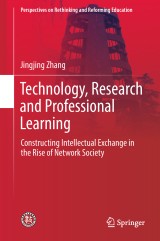Details

Technology, Research and Professional Learning
Constructing Intellectual Exchange in the Rise of Network SocietyPerspectives on Rethinking and Reforming Education
|
53,49 € |
|
| Verlag: | Springer |
| Format: | |
| Veröffentl.: | 20.06.2018 |
| ISBN/EAN: | 9789811308185 |
| Sprache: | englisch |
Dieses eBook enthält ein Wasserzeichen.
Beschreibungen
This book investigates the use of network technologies in research, and explores how such use potentially changes the nature of professional learning between academics. It attempts to situate the discussion of technology use in real-world research settings, to identify the different forms of participation in intellectual exchange embedded in academic dialogue, and to further contribute to knowledge on how the use of network technology potentially changes the nature of learning. Multiple data collection methods are employed, in two forms of study: a single case study, and a number of individual interviews. The single case study was carried out over a one-year period, and consisted of interviews (22 interviewees), observations, and document review. Individual semi-structured interviews were carried out over a similar period of time with a wider and different population of 24 academics from different Oxford faculties. Half of these were interviewed twice.The main findings presented in this book demonstrate that the direct consequences of technology use are changes to academic dialogue and scholarly communication in general. The change to this critical aspect of research – scholarly communication – has potentially led to more distributed research in interconnected research environments. It is the changes to scholarly communication and the research environment that consequently affect participation in intellectual exchange.
Preface.- Part One: Historical and Theoretical Accounts.- 1 The Historical Accounts of the Use of Network Technologies in Academia.- 2 Theoretical Accounts of Technology and Learning.- 3 Challenges of Understanding Technology, Research, and Learning.- 4 Definitions and a Model.- Part Two: Scholars and Their Research Contexts.- 5 Interviewing Oxford Scholars.- 6 Wellcome Centre for Neuroethics at Oxford.- Part Three: Network Technology, Intellectual Exchange and Research.- 7 the Nature of Network Technology in Academia.- 8 Intellectual Exchange in Academic Dialogue.- 9 Changes to Scholarly Communication.- 10 Research Contexts Conducive to Intellectual Exchange.- 11 Conclusions.- Bibliography.- Appendices.<br>
<i><b>Jingjing Zhang</b></i> is Director of the Big Data Centre for Technology-mediated Education at Beijing Normal University. She holds a PhD from Oxford University and has also trained at the OECD in Paris and the UN in New York. Her early research in machine learning and information visualization has led her to analyze university curriculum structure. In the past few years, her research has involved collaboration with educationists, sociologists and anthropologists. This has modified her research interests, giving them a focus on social constructivism of learning in real-world settings. She collaborates with scientists to develop data mining techniques (e.g. complex networking analysis) to explore human relationships and activities online, particularly in the learning sciences. This includes the impact on learning and collaboration produced by using open educational resources (OERs), massive open online courses (MOOCs), and knowledge visualization.
This book investigates the use of network technologies in research, and explores how such use potentially changes the nature of professional learning between academics. It attempts to situate the discussion of technology use in real-world research settings, to identify the different forms of participation in intellectual exchange embedded in academic dialogue, and to further contribute to knowledge on how the use of network technology potentially changes the nature of learning. Multiple data collection methods are employed, in two forms of study: a single case study, and a number of individual interviews. The single case study was carried out over a one-year period, and consisted of interviews (22 interviewees), observations, and document review. Individual semi-structured interviews were carried out over a similar period of time with a wider and different population of 24 academics from different Oxford faculties. Half of these were interviewed twice.The main findings presented in this book demonstrate that the direct consequences of technology use are changes to academic dialogue and scholarly communication in general. The change to this critical aspect of research – scholarly communication – has potentially led to more distributed research in interconnected research environments. It is the changes to scholarly communication and the research environment that consequently affect participation in intellectual exchange.
Clarifies the value of intellectual exchange in academic dialogue Interprets the complex relationship between technology, research, and professor learning Equips readers to understand how the use of technology potentially changes the nature of learning in academia
Diese Produkte könnten Sie auch interessieren:

The Professional Education and Development of Teachers of Mathematics

von: Ruhama Even, Deborah Loewenberg Ball

96,29 €

Challenging Mathematics In and Beyond the Classroom

von: Edward J. Barbeau, Peter J. Taylor

149,79 €














